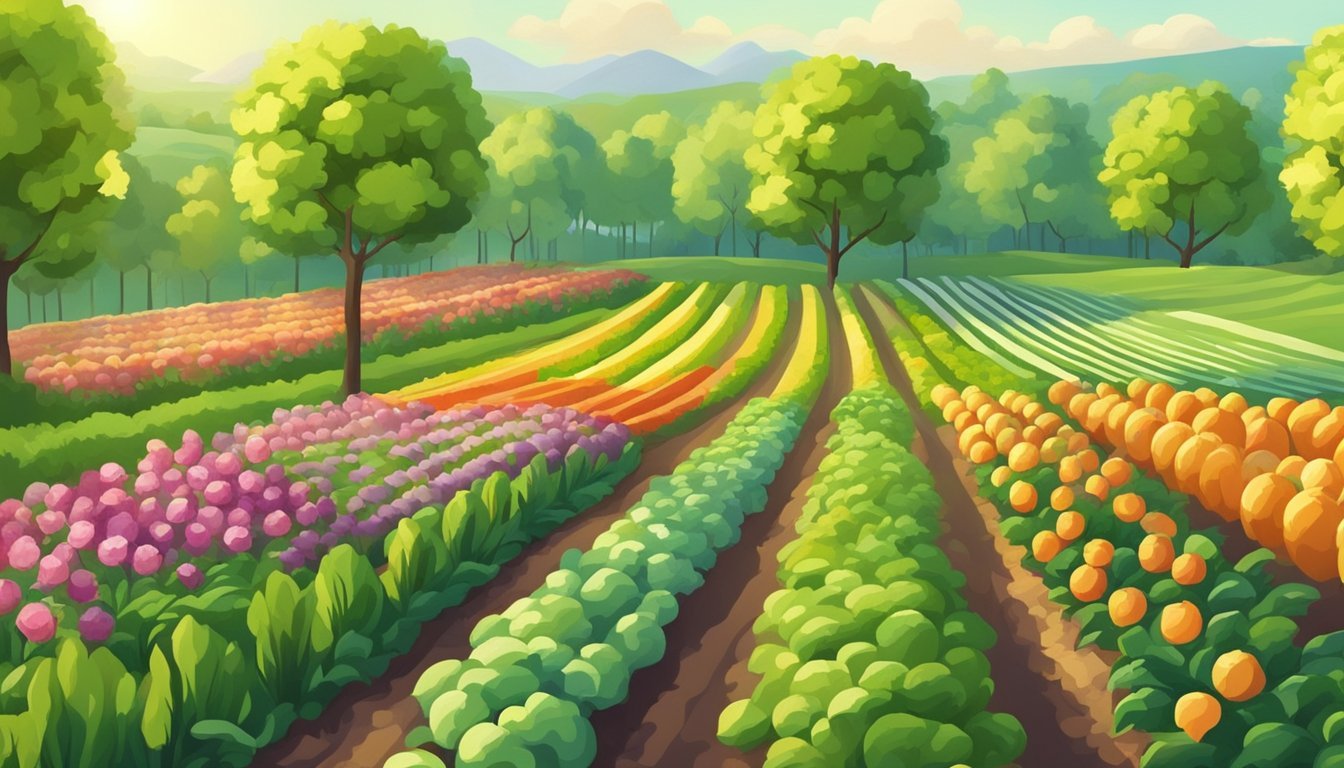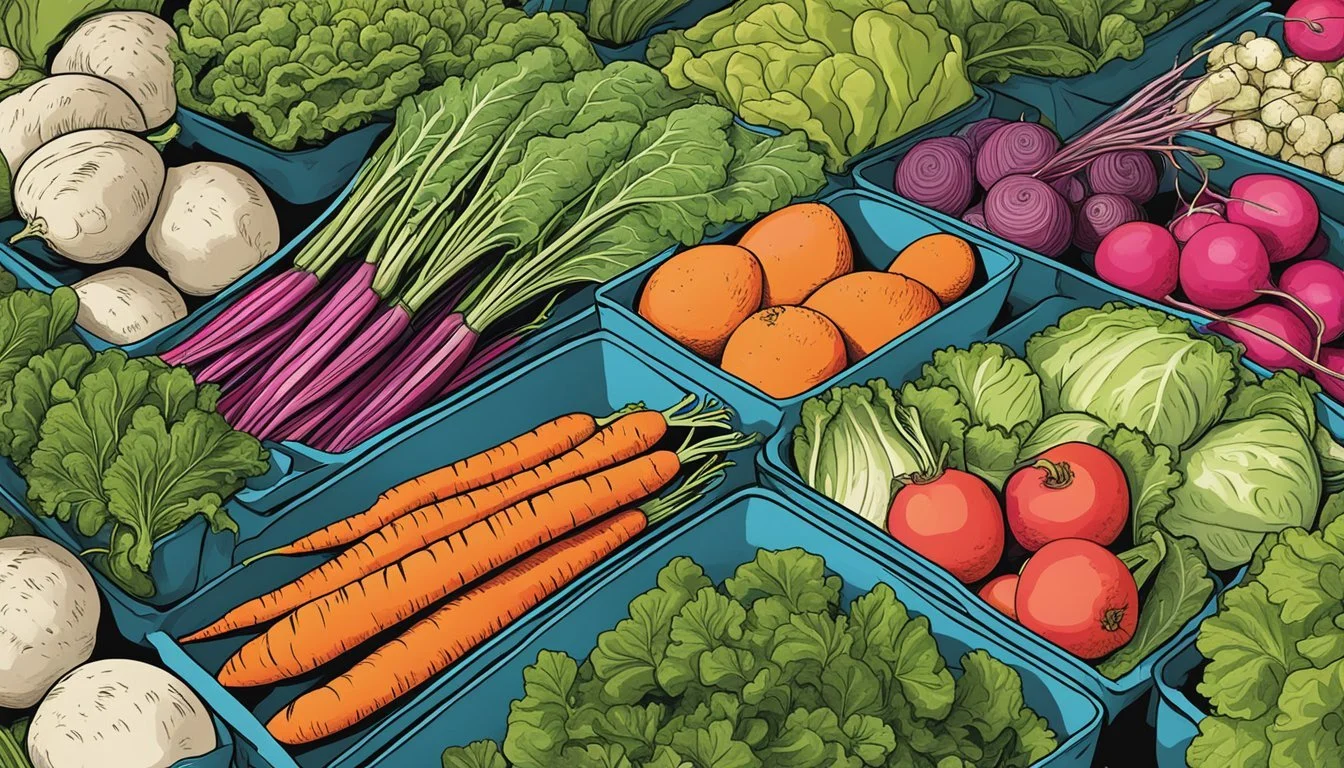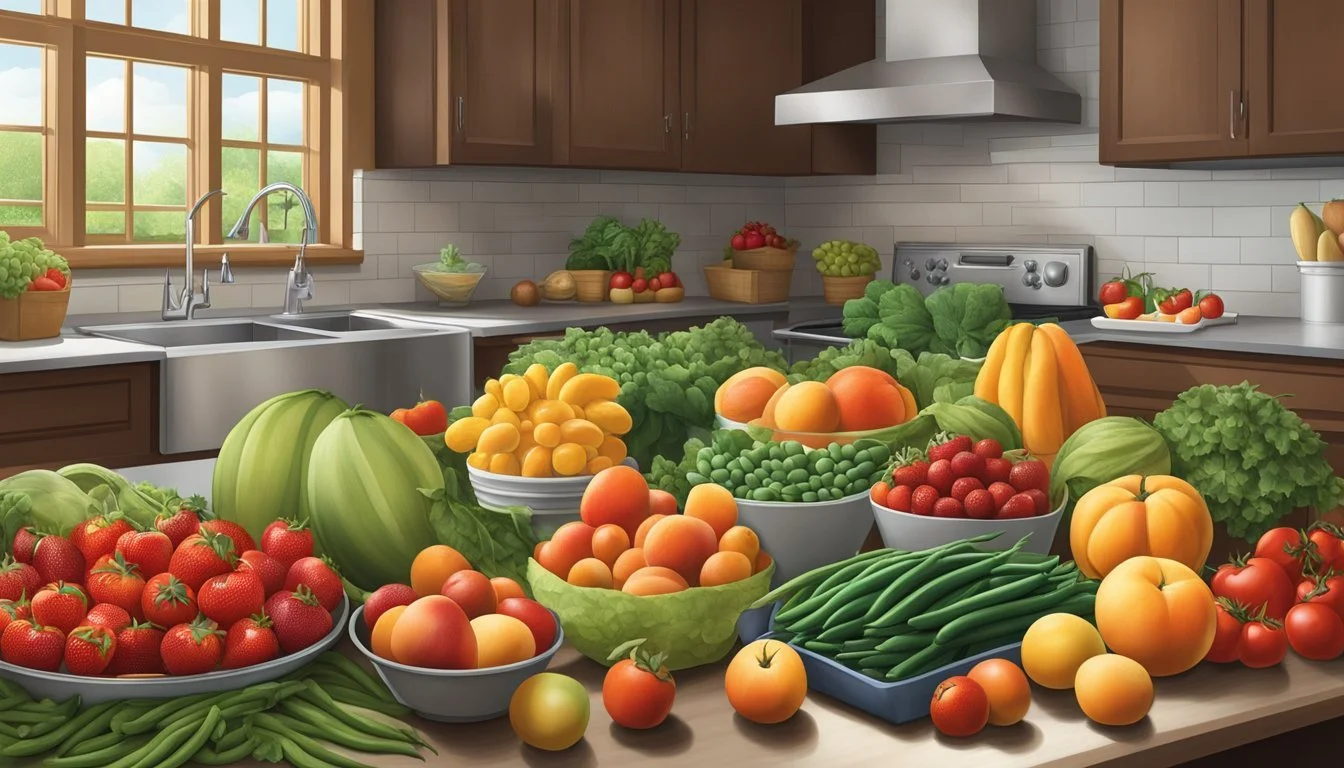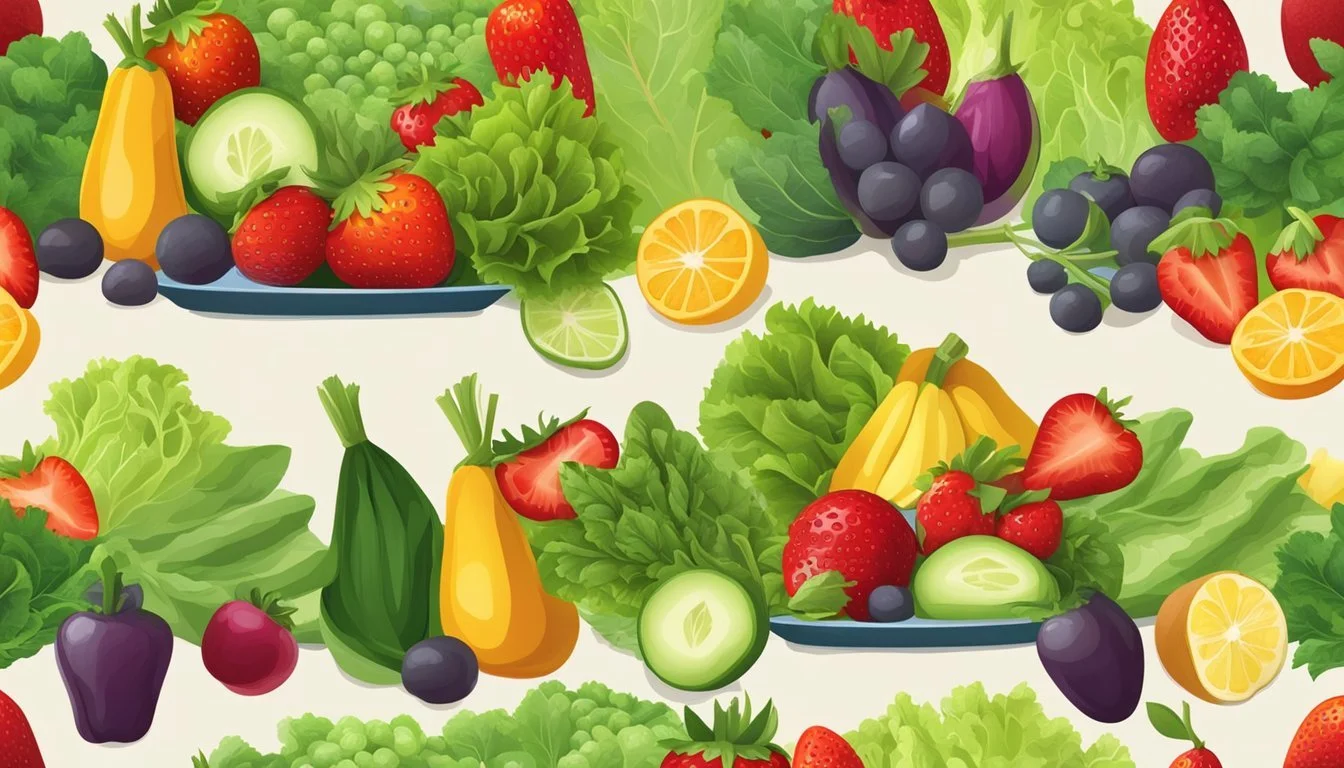Tennessee Seasonal Fruit & Vegetables in April
Your Fresh Produce Guide
This Article is Part of our Tennessee Seasonal Fruit & Veg Calendar
April in Tennessee signals a vibrant period in the agricultural calendar as the state's diverse climate zones welcome a variety of fresh produce into season. Local markets start to fill with an array of colors and textures, offering an exciting selection of fruits (What wine goes well with fruit?) and vegetables that are not just at their peak of flavor but also offer the best nutritional value due to their freshness.
As winter wanes, Tennessee’s soil begins to yield a bounty of springtime crops. Consumers can look forward to staples such as sweet tender greens, root vegetables, and the emergence of delicate fruits. This is the time of year when farm-to-table isn't just a trendy phrase but a literal translation of the agricultural process in the region.
Gardeners and farmers work diligently, adhering to the cycles of nature to provide a selection that includes leafy lettuces, radishes, and the first of the succulent strawberries, among others. Supporting local agriculture during this season ensures not only access to nutrient-rich produce but also bolsters the local economy and provides incentives for sustainable farming practices.
Understanding Tennessee's Growing Season
Tennessee's diverse climate and soil conditions create a dynamic agricultural environment where proper timing and cultivation practices play crucial roles. Understanding these factors is essential for farmers and home gardeners to optimize their crop yield.
Climate and Soil Conditions
Tennessee's climate can be categorized into three distinct regions: East, Middle, and West Tennessee, each with its unique weather patterns. The state experiences a temperate climate that provides a growing season which can range from 130 days to 240 days depending on the region.
East Tennessee: Cooler temperatures with a growing season typically starting in late April.
Middle Tennessee: Moderate climate with a growing season often beginning by mid-April.
West Tennessee: Warmer region, with the growing season starting as early as the first week of April.
Soil conditions vary greatly across the state, from the deep, fertile soils in the valleys to the more rocky and less fertile hilltops. Optimal soil health is achieved through regular testing and appropriate fertilization.
Key Planting Dates and Harvest Times
April signals the start of the planting season for many crops in Tennessee, with May and June being critical months for growth. Specific dates vary by region, but crops like sweet corn, tomatoes, and beans are usually seeded in April for a summer harvest. Detailed planting and harvesting calendars are available through the University of Tennessee Extension publications.
The Role of University of Tennessee Extension
The University of Tennessee Extension plays a vital part in the state's agriculture, offering guidance and resources for both commercial farming and home gardening. It provides region-specific information, including:
Extension publications with planting guides
Workshops on best farming practices
Gardening tips tailored to Tennessee's diverse climate
Gardening Tips for Home Gardeners
For home gardeners, raising a successful home garden involves understanding the local climate and soil. Utilizing raised beds can help bypass soil restrictions, and it's important to match crops to the weather conditions. A mix of organic fertilization methods and conventional strategies often yields the best results.
Organic and Conventional Farming Practices
Organic and conventional farming practices coexist in Tennessee, with each having its own set of guidelines and techniques. Organic farming focuses on natural fertilization and pest management methods, while conventional farming may use a wider range of synthetic inputs. The choice between the two methods depends on the gardener's preferences, crop needs, and environmental considerations. Careful planning and adherence to the University of Tennessee's extension advice can lead to a fruitful harvest season.
Seasonal Fruits in Tennessee for April
April is a transitional month in Tennessee, marking the shift from the last vestiges of winter to the beginning of warmer weather. It sets the stage for the arrival of early summer fruits and the promise of fresh, locally grown produce.
Berries and Early Summer Fruits
During April in Tennessee, the fruit spectrum begins to brighten with the emergence of the first berries of the year. Strawberries often steal the spotlight, showcasing their vibrant red hues and sweet flavor:
Strawberries: In season, often starting mid to late April, depending on weather patterns.
While blueberries, blackberries, and raspberries are not typically ripe for the picking until later in the year, it’s the precursor time for these plants to flower and slowly start the fruiting process, gearing up for their peak seasons coming in subsequent months.
Tree Fruits Availability
Tennessee's April climate is still a bit early for many tree fruits, which are usually not ready until summer or fall. However:
Peaches, plums, and pears: Flowering may begin, but the harvest for these fruits typically occurs later in the year.
Apples: Some early varieties may begin their growth, preparing for a late summer to fall harvest.
Fruit availability can vary depending on the specific regional climate zones across Tennessee, with microclimates potentially influencing earlier or later availability.
Fruit Harvesting and Storage Tips
When it comes to harvesting and storing fruits, timing, and proper techniques are crucial to ensure the freshness and longevity of the produce. Here are general tips applicable to the fruits of April:
Harvest: Always pick fruits at their peak ripeness for optimal taste and storage life. April’s strawberries should be plump, red all over, without green or yellow patches.
Storage: Keep strawberries in the refrigerator, unwashed, in a single layer on a paper towel, and consume within a few days for best quality.
Sustainable practices like proper harvest timing and storage not only extend the enjoyment of Tennessee's seasonal fruits but also reduce food waste.
Seasonal Vegetables in Tennessee for April
April in Tennessee marks a transitional period in gardening as the cool-weather crops continue to thrive and preparations for warm-season vegetables begin. Gardeners can enjoy harvesting a variety of leafy greens and root vegetables while planning the introduction of more heat-loving plants.
Leafy Greens and Salad Ingredients
April is prime time for leafy greens in Tennessee. Garden enthusiasts can expect to harvest several varieties:
Spinach, lettuce, and kale are abundant and perfect for fresh salads.
For a slightly more robust green, collard greens and chard are also in season, offering a nutritious boost to any meal.
Root Vegetables and Tubers
The cool spring soil of Tennessee is ideal for:
Potatoes and sweet potatoes that continue to mature.
Gardeners can also dig up carrots, radishes, beets, and turnips.
Onions, planted in fall or early winter, are approaching maturity and can be harvested as needed.
Cruciferous and Other Hearty Vegetables
Hearty vegetables that withstand April's mild temperatures include:
Cabbage varieties which are reaching peak ripeness.
Broccoli and cauliflower remain in season, offering crisp, flavorful florets.
Brussels sprouts and asparagus, while on the tail end of their season, can still be found in April.
Warm-Season Vegetables Coming into Season
April sees the beginnings of warmer weather and with it the introduction of:
Tomatoes, peppers, and eggplants, which should be started indoors but can be prepared for transplanting as the month progresses.
Gardeners might also see the first sowings of cucumbers and summer squash.
While still too early for corn, soil preparation for this summer staple can begin.
Using Tennessee's Produce in the Kitchen
Tennessee's April harvest offers an array of fresh fruits and vegetables, inviting a season of vibrant cooking and preserving methods. This section provides insights into incorporating these seasonal delights into daily meals and extending their shelf life through proper preservation techniques.
Seasonal Recipes and Cooking Tips
April in Tennessee brings a bounty of strawberries, spinach, and lettuce, alongside a variety of root vegetables like radishes and turnips. One can enhance salads with the crisp, fresh flavors of these greens, while strawberries may be used for sweet and savory dishes alike—from strawberry vinaigrette to classic strawberry shortcakes.
Cooking Tip: Steaming or roasting turnips can bring out their subtle sweetness. Try roasting them with a drizzle of olive oil and a pinch of salt for a simple, yet delicious side dish.
Radishes provide a peppery crunch to tacos and as garnishes to fresh spring soups. Be sure to pair these vegetables with herbs like cilantro or dill that also come into season, to add a fresh burst of flavor to each dish.
Preservation and Processing of Fruits and Vegetables
Preservation allows the extension of Tennessee's seasonal produce through methods like canning, freezing, and pickling. Tender strawberries can be transformed into jams or frozen for later use in smoothies and desserts.
Vegetables like spinach can be blanched and frozen, locking in their nutrients and flavor for future meals. Simple techniques like quick pickling radishes can also provide a tangy treat that lasts for several weeks.
Canning Tip: Always ensure proper sterilization of jars and follow trusted canning recipes to ensure safety when preserving fruits and vegetables at home.
Local Food Systems and Community Impact
Tennessee's local food systems play a crucial role in strengthening the community and economy by supporting farms and providing access to fresh local produce. Farmers markets and direct sales initiatives connect consumers with growers, fostering a sense of community and sustaining local farms.
Farmers Markets and Direct Sales
Farmers markets in Tennessee are a vital link between growers and consumers. By purchasing directly from local farms, community members not only enjoy fresh, seasonal produce but also contribute to the local economy. April in Tennessee brings an array of produce, from leafy greens to the first harvests of strawberries. Here, residents can directly experience the quality of fresh local produce:
Leafy greens such as spinach, lettuce, and kale
Root vegetables like radishes and turnips
Strawberries beginning to come into season
Direct sales at these markets incentivize farmers to continue their craft, while consumers benefit from nutrient-rich, flavorful harvests.
Pick-Your-Own Farms and Agritourism
Pick-your-own farms and agritourism attract visitors looking for an immersive experience. Throughout Tennessee, farms offer the opportunity to pick fresh produce, such as strawberries, right from the source. This interaction not only educates visitors on the farming process but also highlights the importance of supporting local orchards and farms:
Strawberry picking: A popular activity in April, signaling the start of fruit season.
Educational tours: Visitors often gain insights into sustainable farming practices.
Through agritourism, farms become attractions, promoting a connection to the land and a better understanding of where food originates. This engagement is essential for preserving local traditions and boosting the rural economy.
Resources and Further Reading
To deepen their understanding of seasonal produce in Tennessee, readers may find a variety of resources useful. Publications from educational institutions, workshops, and online tools can all contribute to a comprehensive view of gardening and farming in the state.
Extension Publications and Guides
The University of Tennessee Extension offers publications and guides that are essential for anyone looking to learn about fruit and vegetable gardening in the state. These resources cover planting dates, care instructions, and seasonal availability.
2024 Home Vegetable and Fruit Calendar: This tailor-made guide helps gardeners navigate the varied climate zones within Tennessee, providing average planting dates for an array of produce.
Tennessee Home Fruit and Vegetable Garden: This includes detailed data and recommendations tailored to home gardeners across the state.
Gardening and Farming Workshops
Educational workshops provide hands-on learning opportunities for both new and experienced gardeners and farmers. These events cover a range of topics from basic gardening techniques to more advanced farming practices.
Local County Extension Offices often host seasonal workshops.
Annual events may focus specifically on seasonal produce, offering guidance on what to plant and harvest during the month of April.
Online Resources for Tennessee Produce
A variety of online resources are available to those interested in the availability of seasonal produce in Tennessee.
Pick Tennessee Products website: Features a guide on what's in season and where to find local produce.
Social media groups and forums: Gardeners and farmers can connect, share insights, and discuss seasonally available fruits and vegetables.
In utilizing these resources, individuals can gain a clearer understanding of the gardening and farming landscape in Tennessee, especially regarding what to expect in the month of April.







